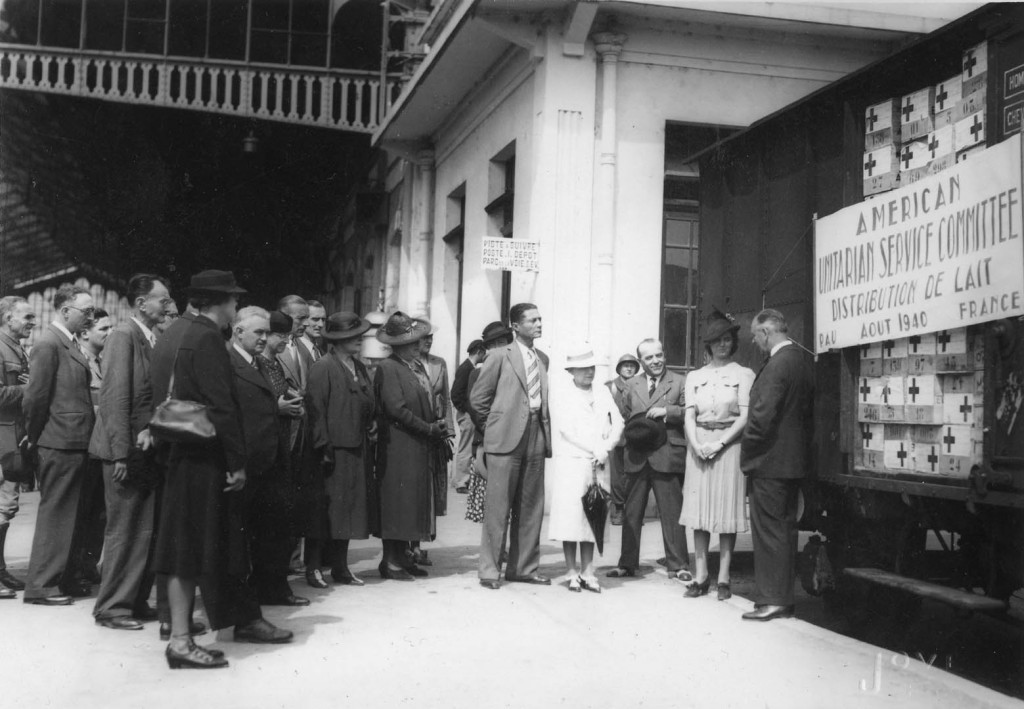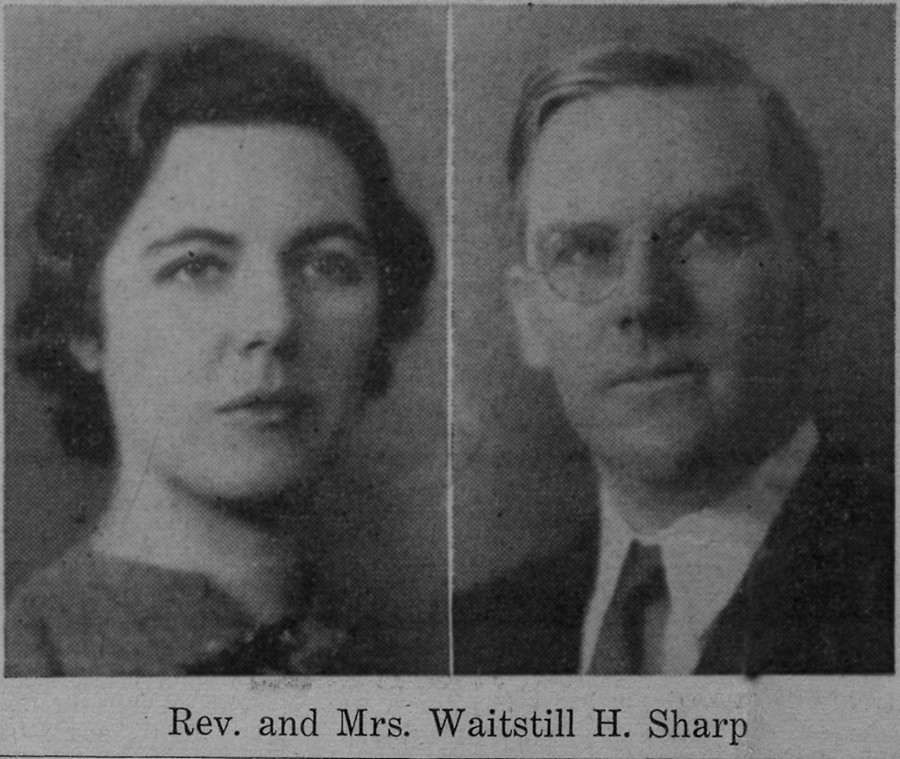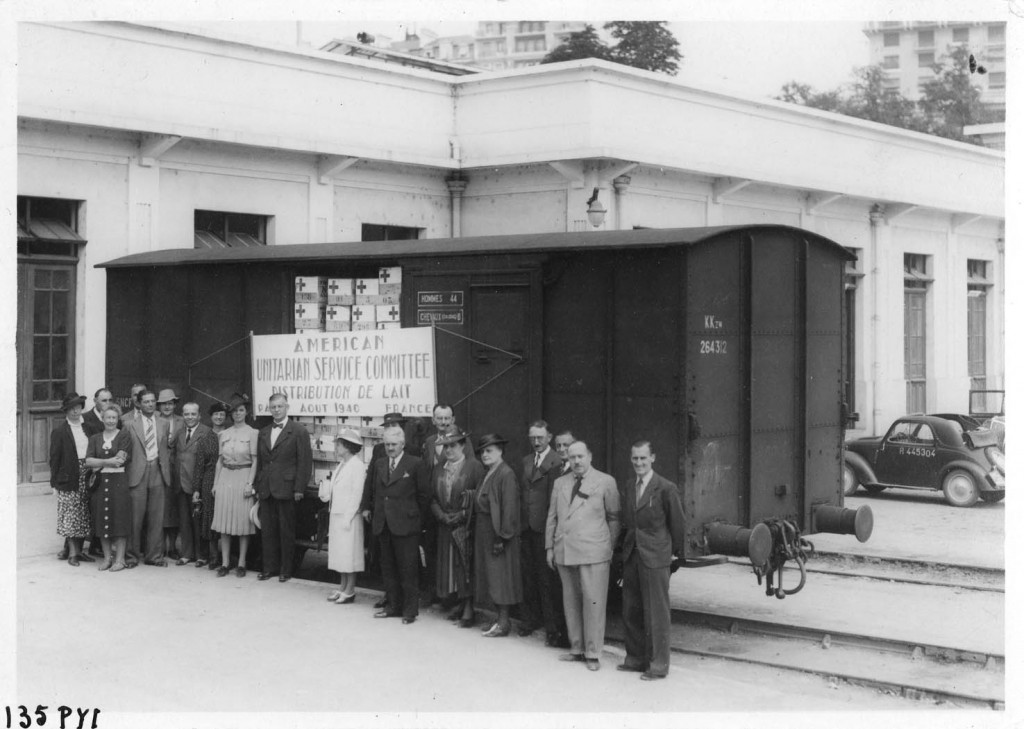
Martha and Waitstill Sharp
Martha and Waitstill Sharp, American Unitarian aid workers, helped thousands of people escape Nazi persecution in 1939–1940. Among those they helped were Jews, intellectuals, and children in Prague, Lisbon, and southern France. In recognition of the risks they took to assist Jews, Yad Vashem, the Holocaust Martyrs' and Heroes' Remembrance Authority in Israel, honored the Sharps as Righteous Among the Nations in 2006.
Key Facts
-
1
Waitstill Sharp, a Unitarian minister, and his wife Martha, a social worker, traveled from Massachusetts to Prague in 1939. There, they distributed money and helped intellectuals escape to the United States.
-
2
The couple later went to Lisbon and southern France to distribute food, and to help Jews and intellectuals escape. Martha also organized a transport of children to the United States. This effort became a model for later transports of child refugees.
-
3
Martha and Waitstill Sharp became the second and third Americans honored by Yad Vashem as Righteous Among the Nations. This distinction is granted to non-Jews who risked their lives to save Jews during the Holocaust.
Introduction

Waitstill Sharp was born in 1902, and graduated from Harvard Law School in 1926. Martha Ingham Dickie was born in 1905, and studied social work at Northwestern University. She trained at Jane Addams’ famous Hull House settlement. The couple met in 1927 and married a year later. Waitstill returned to Harvard, where he graduated from the Divinity School in 1933. He was ordained as a Unitarian minister.
The couple lived for a brief time in Meadville, Pennsylvania, where Martha gave birth to their two children, Waitstill Hastings and Martha Content. The family then moved to Wellesley Hills, Massachusetts, where Waitstill had a new congregation.
The Munich Pact
The Nazis seized power in Germany in 1933. Soon after, Germany demanded the “return” of the ethnic German population of Czechoslovakia—and the land on which it lived—to the German Reich. In late summer of 1938, Hitler insisted upon the annexation of the Sudetenland, a border area between Germany and Czechoslovakia. This area contained a majority ethnic German population. At the Munich Conference, held on September 29–30, 1938, the leaders of Britain and France agreed that Nazi Germany could annex this territory in exchange for Hitler’s pledge not to wage war. Czechoslovakia was not permitted to attend the conference.
Unitarians in the United States who had ties to churches in Czechoslovakia were stunned by the news. Unitarian leaders in Prague were soon flooded with requests for assistance from political dissidents, Jews, and other refugees fleeing the Sudetenland, Germany, and Austria. They all sought refuge in free and democratic Czechoslovakia.
The American Unitarian Association (AUA) organized a relief effort for refugees in Czechoslovakia. Robert Dexter, the director of the AUA’s Department of Social Relations, sailed to Europe to assess the situation. When he returned, he recommended the Unitarians try to help Jews and anti-Nazi Germans from the Sudetenland, Austria, and Germany.
Prague
The AUA raised more than $40,000 to support the newly formed “Commission for Service in Czechoslovakia.” The AUA leadership asked Waitstill and Martha Sharp to travel to Prague to assist refugees. Motivated by their faith and their moral outrage, the Sharps made the difficult decision to accept the charge. They left their two small children in the care of close friends in the congregation. On February 4, 1939, they set sail for Europe. They stopped several times en route to Prague, setting up a network of volunteers and agencies. This network assisted the Sharps over the next six months as they traveled to and from Prague.
Less than a month after the Sharps arrived, the Nazis invaded and occupied Czechoslovakia. The Czech President, Emil Hácha, surrendered the country without resistance. On the morning of the invasion, the Sharps needed police assistance to enter their offices in Prague, because the crowds gathered outside were so large. Waitstill made an announcement to clarify that their offices were not American territory, and that they were not an emigration or visa agency. During the chaos of the day, Martha even had to talk down a man threatening to use a gun. Nevertheless, the Sharps agreed that Martha would focus on individual immigration cases, while Waitstill would focus on the relief projects they had been sent to facilitate.
For the next six months, the Sharps' work was divided between relief and emigration assistance. The couple assisted refugees with immigration paperwork, distributed relief money and goods, and helped refugee intellectuals find employment in the United States. Much of their activity involved helping individuals. On one occasion, Martha escorted 35 refugees—journalists, political leaders, and orphaned children—to England. She concealed their identities from Nazi authorities along the way. Martha also cooperated with British organizations to gather children for Kindertransports.
In late summer 1939, Waitstill Sharp left Prague for a conference in Switzerland. Nazi authorities prevented him from returning to the German-occupied Czech provinces. Martha joined him a week later, narrowly escaping arrest by the Gestapo. They sailed for the United States at the end of August, returning as World War II broke out in Europe.
The Unitarian Service Committee
After the Sharps left Europe, the AUA's Robert Dexter and his wife, Elisabeth, embarked on a 10-country fact-finding mission. This mission led to the establishment of the Unitarian Service Committee (USC). The Sharps, the Dexters, and Unitarian minister Charles Joy are considered the five founding staff members of the USC.
Lisbon
In May 1940, Frederick May Eliot, president of the AUA, asked Waitstill and Martha Sharp to return to Europe. This time, they were sent to France as the Unitarian Service Committee's “ambassadors extraordinary.” But before they could arrive in Paris to set up an office, the Germans occupied the city. The Sharps opened an office in Lisbon instead. Thousands of refugees were escaping to neutral Portugal. They hoped to find safety and a ship to take them to the United States or another destination outside of Europe.
The Unitarian office in Lisbon remained open throughout the war. The Sharps, Charles Joy, and the Dexters each staffed the office at various times. In collaboration with many other individuals and organizations, they helped several thousand people escape. The Unitarians focused on political refugees, academics, scientists, and intellectuals. Political refugees were people who had spoken out against Nazism in Germany or fascism in Spain and whom other organizations were reluctant to help.
Among those the Sharps directly helped escape was the German Jewish novelist Lion Feuchtwanger. Waitstill Sharp sailed with Feuchtwanger to New York. The trip was possible because Martha Sharp gave up her ticket to ensure passage for Feuchtwanger.
Marseille
While Waitstill Sharp spent most of his time in Lisbon, Martha Sharp worked at a new Unitarian Service Committee office in Marseille. The French city was the primary port in unoccupied Vichy France from which refugees could escape. During this time, the Unitarian Service Committee worked closely with Varian Fry. An American, Fry had been sent to Europe by the new Emergency Rescue Committee (the forerunner of today's International Rescue Committee) in New York. As refugees escaped with the help of the Emergency Rescue Committee, the USC helped them navigate the French-Spanish border. The USC also assisted with travel arrangements and money once the refugees reached Lisbon.

In Marseille, Martha focused on distributing milk to French children. She also organized a children’s transport to the United States. Martha doggedly battled numerous bureaucracies to secure exit visas, transit permits, and identity papers for 29 children and 10 adults. She sailed from Lisbon with two children and four adults in early December 1940. The others followed on a second voyage. Martha’s organization of the children’s transport became a model for the United States Committee for the Care of European Children. That committee brought several hundred children from France, Spain, and Portugal to the United States during World War II.
Wartime and Postwar
During the war, Martha gave numerous speeches on behalf of the Unitarian Service Committee. Both Martha and Waitstill advocated for the American Relief for Czechoslovakia organization. In 1944, Waitstill Sharp was appointed to a United Nations Relief and Rehabilitation Administration (UNRRA) position in Cairo. Martha returned to Spain and Portugal, where she assisted refugees, mainly Spanish Republicans, to immigrate to South America.
In 1946, Martha ran for Congress. She lost, in part because of accusations that the USC was a leftist, communist-supporting organization.
Having spent so much time apart, Martha and Waitstill decided to divorce in 1954. Both eventually remarried. Waitstill Sharp passed away in 1983. Martha Sharp Cogan died in 1999.
Righteous Among the Nations
In 1963, Yad Vashem established the title of Righteous Among the Nations to honor non-Jews who risked their lives to save Jews during the Holocaust. In 2006, Martha and Waitstill Sharp were the second and third US citizens, after Varian Fry, to receive this designation.
Critical Thinking Questions
What pressures and motivations may have influenced the Sharps?
Are these factors unique to this history or universal?
How can societies, communities, and individuals reinforce and strengthen the willingness to stand up for others?

